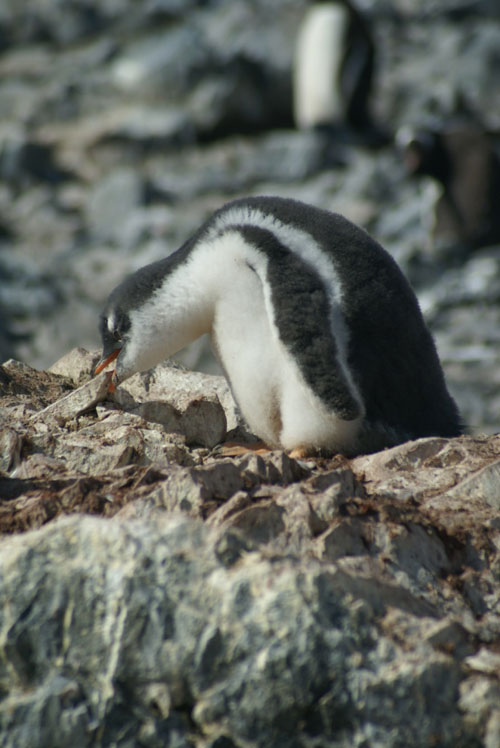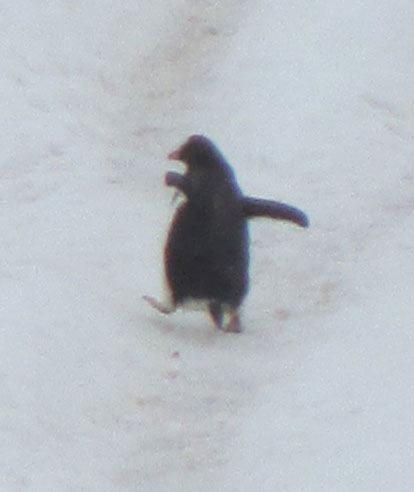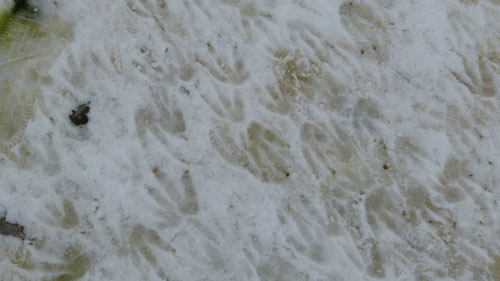As Revealed to George Walther, a passenger aboard the vessel, Akademik Sergey Vavilov, on February 18, 2014 by “Geraldine” at Madder Cliffs, Antarctic Peninsula
"I've just returned from a visit to Antarctica and will write
about the experience soon. For now, though, I want to share my fanciful interview with a penguin I met very briefly before she headed to Penguin Heaven."
George:
Not many penguins agree to give intimate interviews, and I thank you for your willingness to help me understand how you’ve lived your short life. Many of my fellow adventurers came here to Antarctica thinking that all penguins were just cute black and white birds that couldn’t fly. We arrived on a Russian ship with wonderful naturalists who taught us about how you live. What’s the first thing you remember?
Geraldine:
Feeling cramped! I couldn’t move. I was completely hemmed in by some weird confining structure. I noticed that the lighting conditions changed frequently. For a short while, I’d briefly sense a white glow around me, and then everything went dark. Usually about that time, I heard a strange sound, something like a kazoo. Then it would get light for a short while, and then dark again.
George:
That was when you were still inside your egg.
Geraldine:
I can tell you it was very uncomfortable. And I couldn’t figure out why it kept getting dark and then light. This went on for more than a month.
George:
That was because your mom and dad took turns sitting on your egg, trying to keep you warm and incubate you until you were ready to hatch. That lasted for 32 to 35 days. Each time they handed over the job to your other parent, it got bright for a few seconds when neither one was sitting on your egg. Penguin parents share their parenting jobs way better than most humans do.
Geraldine:
Maybe I was impatient, but I couldn’t stand the cramped conditions and began to peck at that white thing that was surrounding me and eventually managed to poke a small hole. It was far too small to get out through, so I gradually enlarged it by pecking and pecking. I’ll tell you that was exhausting.
George:
Kind of like the animated penguin in the ‘Happy Feet’ movie. And when you finally managed to squeeze out, what’s the first thing you saw?
Geraldine:
Another oblong white thing that looked like the one I had just pecked my way out of. Within a few minutes, I realized it contained another little creature much like myself, and he pecked his way out, too. It turned out to be my brother, Gerald. He was a little smaller than I was, though.
George:
A lot of us saw a movie about Emperor Penguins where the dad holds the egg on his feet while the mom leaves for months to get food. But you’re a Gentoo, not an Emperor. Were you hatched in a nest?
Geraldine:
You could call it that, but it was nothing like the cushy padded twiggy ones that flying birds build. Ours was made of rocks and pebbles. Our parents gathered pebbles in their beaks and built them up. Some of the other parents were cheaters, though. Instead of going to find their own rocks, they’d steal the ones that my parents had gathered. My friends and I tried picking up little rocks the same way we’d seen the cheaters do.
George:
Once you were out of your shell and your parents were feeding you, you were what we call a hatchling. Other than Gerald, were you alone?
Geraldine:
Oh no. My mom and dad were very attentive. They took turns, heading off one after the other to get food for me. And then they’d switch roles, just like when I was still inside that cramped egg. One stayed with me while the other fetched. I wasn’t sure where they’d gone, but I did discover that each time they returned, they turned their heads sideways and opened their beaks really wide and made that strange sound, sort of a metallic horn tooting. That’s when I discovered that if I pecked right at their beaks, they’d cough up a reddish mush of regurgitated krill. They’re like little tiny lobsters, but translucent with some red dots. Sometimes some fish bits were mixed in, too. Man, was that ever tasty!
George:
And what about your brother?
Geraldine:
Actually, I could see from the start that he wasn’t nearly as strong as I was. He looked hungry and a little scrawny. Little by little, I got the feeling that mom and dad liked me better and they gave me more of that delicious krill mix than they gave him. He never had much energy, and I tried to be a good big sister and let him lean on me, but one day he just gave up and stopped moving. He lay down on a rock and looked like he’d just given up. A big Skua bird swooped down and took him away and I never saw him again.
George:
Gentoo parents almost always lay two eggs, and the second one is always a little smaller and hatches three days after the first. You’re fortunate that you were the first, larger egg. Usually the second chick, like Gerald, doesn’t survive.
Geraldine:
This may sound mean, but I was actually glad my brother wasn’t competing with me for the yummy regurgitated krill my parents brought. I got it all, and I could tell that I was growing fast.
George:
Conditions are pretty harsh in Antarctica with those icy katabatic winds blowing down off the glaciers. Weren’t you cold?
Geraldine:
Not a bit. I was surrounded by a furry ball of fluff. I noticed that wind gusts blew my fluff around, but I felt very cozy, safe, and warm because mom and dad took turns protecting me.
George:
That fluff is what we call “down.” We use the same stuff to make warm sleeping bags and jackets. As long as it’s dry it keeps us very cozy, too.
Geraldine:
Well, it worked fine for me. But only for about six weeks. By then, thanks to the regular krill feasts, I had gotten a lot bigger and started to feel very itchy. Tufts of my fluffy down started to come loose and blew right off my body.
George:
That’s what we call molting. Your body was actually pushing out the tufts of down and replacing them with the feathers you’d need to protect yourself from the harsher elements once your mom and dad weren’t around. You couldn’t go into the water with your down because you would have just become soggy and sunk. The feathers your body was growing had some special properties that would allow you to swim once they’d grown in.
Geraldine:
Funny, but I don’t remember much swimming, except for just that one time.
George:
I was there to watch your very first swim, but that’s a sad story we’ll save for later.
Geraldine:
That’s when I started really making friends.There were quite a lot of us molting together then. After about two months, mom and dad started leaving me alone while they went off to feed. They’d already made sure I understood that it could be dangerous when the big mean Skua and Petrel birds circled overhead. After one of them took Gerald, I saw others snatch a couple of my friends and I never saw them again, either. So, I knew that danger was always overhead.
George:
What about those big seals who shared your beach. Weren’t they dangerous?
Geraldine:
Not really. We got along, as long as we were on the beach. I’d see them looking up from the shore, almost like they wanted to play.
George:
You were actually in what we call a colony or a rookery. When you were about a month old, your parents let you play with the other chicks and you gathered in big groups called crèches. And although most of your friends were also Gentoo Penguins, once in a while you had visits from some Chinstraps, and Adelies, and one or two Rockhopper Penguins were there, too.
Geraldine:
I remember them. They were very funny looking, especially those Rockhoppers. They had ridiculous colored tufts on each side of their head and bright red eyes. We laughed at the Chinstraps because of that white line under their chins that made them look like they were wearing funny hats.
George:
You looked rather funny, yourself. As you were molting, tufts of fluff were left on some parts of your body, often on top of your head. Like those Adelies with the white circles around their eyes, you both looked like some sort of punk kids with weird Mohawk-like hairdos.
Geraldine:
Hey, now! You and your human friends looked pretty funny in those red jackets and pants. It was exhausting for us, doing that molting thing. Mostly, I just felt tired and rested a lot.
George:
You thought you had a lot of friends around when you were molting, but you should have seen the colony of King Penguins I visited on South Georgia Island. There were 200,000 of them on one beach called Salisbury Plain! They look different from you. They’re taller, and have bright yellow and orange patches on their chests and on the sides of their faces. They don’t have a red beak like you and your Gentoo friends.
A sea of 200,000 King Penguins
Geraldine:
200,000 in one place! That’s a lot of penguins! How can they find their friends and parents?
George:
The same way you do. To humans, you all look and sound alike. But you and the Kings can tell one bird from another by the sound of their call, and you have very good senses of smell, too. I was just offshore on a Zodiac rubber boat with my own friends, and we could see you onshore making your way up as high as you could get on the snowfields and hillsides. Sometimes you climbed up hundreds of feet.
Geraldine:
Yes, that was great fun. There were special pathways through the snow that made it pretty easy to go up. And getting down was a breeze. If we stumbled, we’d just slide on our bellies.
George:
We call those “penguin highways,” and you actually made some strange snow formations without knowing it. As you waddled your way up the steep snowy slopes, your feet compressed the snow, and sometimes you pooped where you walked. Quite a bit, actually. Whenever the sun was out, those compressed paths of poop heated faster than the other snow on either side. They melted, leaving grooves in the snow and ice. That’s what created what seemed to you like special paths. To us, they almost looked like giant white Hershey kiss candies.
Geraldine:
Speaking of poop, I couldn’t believe how rude some of the other penguins were. They squirted poop right at me over and over again. It did stink a little wherever lots of us gathered, since we all had to poop out our pink krill, but it was nothing compared to the awful stink of those big seals that did nothing but lay around snarling and snorting and farting.
George:
When I was out in the Zodiac boat, my friends and I noticed a large dark shape swimming toward us and then right under the boat. It was a Leopard Seal, and it certainly didn’t look cute like the Antarctic Fur Seals or Crabeater Seals that shared your beach. It looked ominous and almost prehistoric. It had a big squarish head that reminded me of big scary Komodo Dragon lizards. The naturalists on our ship had explained that Leopard Seals like to snatch penguins and eat them, so we were worried out in that little rubber Zodiac boat, looking at you and your friends all gathered on top of an iceberg. We’re not allowed to interfere in your lives, but we were whispering, “Don’t go in the water!” You looked like you were getting up the nerve to jump in, even though you didn’t really know how to swim yet.
Geraldine:
That must have been just about when a few of my friends decided to dive into the water for the first time. Their feathers had grown in after their molting was complete. They’d seen their parents and the other adults diving and swimming in the water, and it looked like great fun.
George:
Yes, but we were worried about you. There you were, at the edge of the ice, cocking your head from one side to the other, curious about your friends awkwardly swimming and teaching themselves how to be sleek underwater like their parents. And that’s when we could see that the Leopard Seal was moving closer to the edge of the ice where you were.
Geraldine:
I didn’t want to miss out on the fun, so I decided to jump in like my friends just had. Right away, I could tell that being in the water felt a lot different than being up on the ice. And right after I splashed in, I saw a dark shape moving right toward me underwater. I think it was the same dark creature you’d seen from the boat. I thought maybe I should swim away, but I’ve never done it before, so I wasn’t very good at flapping my stiff wings underwater. And just a few seconds later, wham! Something hit me from behind. I felt a squeeze all over my body, and it didn’t feel good. But then, a second later, I was up in the air, flapping my wings and trying to fly like those dangerous Petrel and Skua birds I’d been taught to watch out for.
George:
But nobody had taught you to watch out for Leopard Seals, because you’d never been in the water before. My friends and I gasped in the Zodiac, and some of us took a lot of pictures of you up in the air.
Geraldine:
I was only up there for a second, and then I splashed down again, and I felt the squeeze again, and was once again flung up in the air, and down again. And then that big dark seal grabbed me in his mouth and pulled me way underwater, where I’d never been before, and I couldn’t breathe. But just as I was running out of air, he pushed me to the surface and I tried really hard to swim away, but no matter how hard I struggled, he kept grabbing me and flinging me up in the air. At first I thought it might be fun, but pretty soon it wasn’t.
George:
I watched you struggle for twenty minutes. That seal kept flinging you around and thrashing you onto the surface of the water. You never stopped flapping and I couldn’t believe how long you kept struggling to get away. I’ve have seen a house cat batting around a helpless little mouse before killing it. It seemed like the cat was just having fun torturing the little mouse, and it looked like the seal was doing the same thing with you.
Geraldine:
Well, it wasn’t any fun for me. And after a while, I don’t remember anything else.
George:
That’s about when I started humming that Elton John song from The Lion King about the “Circle of Life.”
My thanks go to the superb naturalists onboard who verified the facts pertaining to the penguins’ behavior referenced above. And, I gratefully acknowledge my fellow cruisers who contributed their photos to share with me. Although I used my GoPro camera throughout the voyage, many serious photographers with big lenses shared their excellent photos.

























